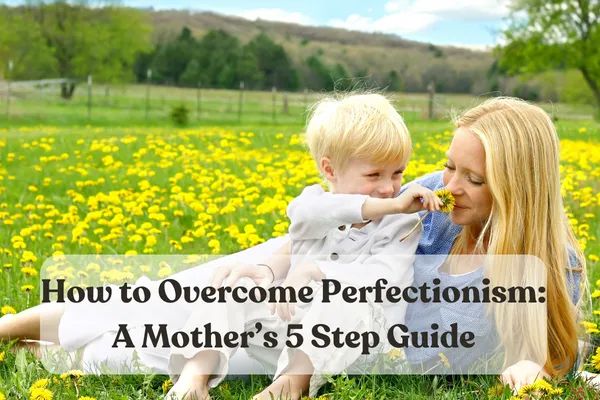BLOG
Taking back control, one day at a time

How to Overcome Perfectionism: A Mother's 5 Step Guide
Hey mamas! Let’s overcome perfectionism. It’s a tricky puzzle many of us are navigating as we get through the whirlwind of motherhood. It’s like this persistent companion, always tagging along, making life extra complicated.
But the further we go down the perfection rabbit hole, we run into feelings of unhappiness, sadness, and anxiety. And we end up affecting the people closest to us with it.
Living a life as a perfectionist mom, we impact our children and families, setting the tone that being perfect is the goal. When we live like this, we unintentionally teach our children to be perfect and create unrealistic expectations along the way.
Read on to learn how to overcome perfectionism in 5 steps.

Overcoming Perfectionism
Step 1: Unpack the Perfectionism Puzzle: Get to the Root Cause
Perfectionism is like an uninvited guest that overstays its welcome. It’s time to show it the door! But first, let’s go deeper. Where does it come from? Does it come from our parents, external influencers, or perhaps the nonstop comparison game?
Our upbringing plays a vital role in shaping our perfectionist tendencies. Our parents and people who were present during our upbringing have a huge impact on the people we later become. Whether they know it or not, they also have a way of passing down their expectations on us. The desire for success may have been influenced by an individual or individuals, planting the seed of perfectionism early on.
In addition to parental and other important figures, comparison can also become a breeding ground for perfectionism. Social media and other sources make it easy to take quick glimpses into the lives of others.
Falling down this trap can make it easier to compare yourself to other moms and attempt to live a life that is completely unrealistic for you. This type of comparison makes it easier to fall prey to perfectionism.
Step 2: Reality Check Time: Acknowledge the Negative Effects
Brene’ Brown is well known for her research on shame and guilt and how it ties into perfectionism.
One of her quotes states, “Understanding the difference between healthy striving and perfectionism is critical to laying down the shield and picking up your life. Research shows that perfectionism hampers success. In fact, it’s often the path to depression, anxiety, addiction, and life paralysis.”
There is absolutely nothing wrong with trying your best and striving for better. But there is a clear line between striving for excellence and striving for perfection.
When you strive for perfection, it’s not surprising that feelings of depression, anxiety, addiction, and life paralysis can occur.
Oftentimes, depression is focused on the past. Reassessing a situation that didn’t go perfectly as planned, can make you feel sad, confused, and unsure about yourself or your abilities.
Anxiety, on the other hand, usually focuses on the future. Thinking ahead of what’s to come and how you’d like things to be can increase feelings of anxiety.
Addictions with perfectionism may stem from a person trying to cope with the feelings of depression and anxiety caused by unrealistic expectations.
In this dance of motherhood, acknowledging the negative effects of perfectionism is necessary to begin releasing ourselves from the perfectionist grip.

Step 3: Rewrite Our Story: Identify and Reframe the Narrative
The words we choose carry immense power, especially when trying to overcome perfectionism.
Starting with little phrases like “I should be…”, “I need to…”, or “I have to…”, using phrases like these can restrict your actions. It also supports unrealistic expectations and leaves little room for mistakes or change.
The phrases above may also increase anxiety, causing us to create narratives of how things “ought” to be rather than how they are.
It is important to pay attention to the things we tell ourselves. What we say to ourselves matters.
When dealing with perfectionistic thoughts, it is easy to start creating stories in our minds that often lack factual backing. This type of thinking is heavily influenced by cognitive distortions.
We all have them but when they heavily influence our thoughts and behaviors it can be problematic.
One cognitive distortion that supports perfectionism is mind reading. When we practice mind reading, we make assumptions about what other people are thinking.
Another cognitive distortion that supports perfectionism is all-or-nothing thinking. It’s when a person thinks it has to be all one way or no way. That is often seen in perfectionism when a person will refrain from doing something because it isn’t perfect and will only consider doing it if it is going to be perfect. Super unrealistic, right?
It is important to identify what we’re saying to ourselves and how we feed our perfectionist thoughts. In order to overcome that type of thinking, it helps to recognize how harmful those types of thoughts may be and reframe the thoughts.

Step 4: Embracing Imperfection: Accept Being Good Enough
Truly learning to overcome perfectionism is to accept the power of being good enough. Acceptance plays a huge role in being content and happy with the now. And I’m not referring to the acceptance of others, our own acceptance is key here.
It is okay to receive compliments and many perfectionists are used to that but we are the ones that have to be accepting of our accomplishments or the things we do.
I get it, it feels good to know that others think whatever we did was great but here’s a reminder: You don’t need the approval of others to be valued.
Aiming for good enough, instead of perfect can help to relinquish stress. There is nothing wrong with striving for excellence. But we must be fair to ourselves and be able to identify the differences between striving for excellence or perfection.
It could help to ask yourself questions like, Am I giving it my all? Am I proud of my work? If you can say yes to both, then it is more of a striving for excellence.
In the realm of being a mother, where things may not go as planned, giving ourselves the permission to be accepting of our own flaws can help us transform our perfectionistic ways.
Step 5: Keep in Mind: Remember Perfectionism is Unrealistic and Unhealthy
Motherhood is anything but perfect all the time. It is filled with long days and nights, things not going as planned, and plenty of unexpected hiccups. And if you’re anything like me, I know you wouldn’t change any of it for the world.
It is important and practical to remember that perfection is impossible. It is also an unrealistic measure and will cause us more harm than good.
Understandably living to meet perfectionistic standards can easily become a lifestyle to the point that it almost feels innate. However, it is not healthy to constantly live as though we are above making mistakes.
Allowing ourselves to make mistakes is also a great way to teach our children that it is a normal part of life.
As innate as it may feel to strive for perfection it is vital to remember the wear it can have on us mentally, emotionally, and physically. It can also set the wrong example for our children.

Closing Thoughts
Embarking on the journey to overcome perfectionism is undoubtedly challenging, but it is worth it for it has a big impact on us and our families. However, the more efforts you make to bring awareness to your perfectionist behaviors and begin putting new habits in place, the more attainable overcoming perfectionism will become.
It is not an easy journey but I know you can do it. And as always, I’m wishing you good mental wellness!

MINDFULNESS WITH ME
Come rejuvenate your mind with me.
Sign up for a FREE mindfulness session where we will practice mindfulness through meditation and journaling every last Sunday of the month.
© Copyright 2023 Naturally Anxious